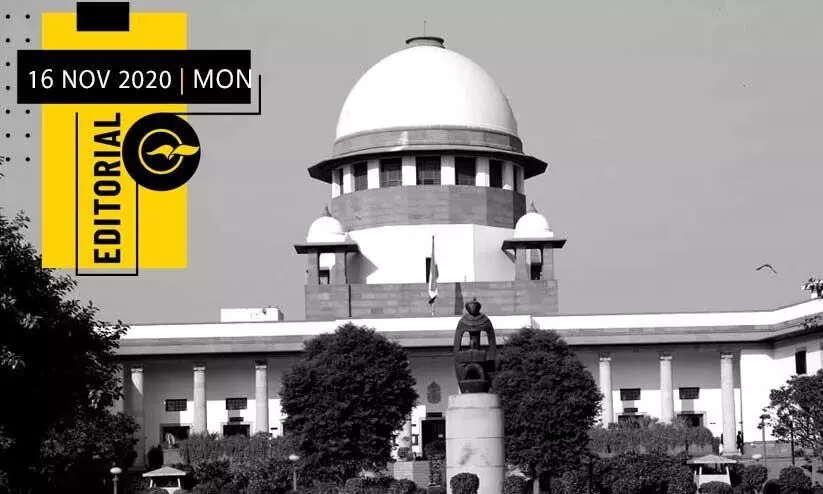

Can counter dissent, but not through suppression
text_fieldsIt is rather disturbing that the highest court of the country gives room for adverse reactions from advocates of freedom and democratic rights. Under debate now is the unusual speed and keenness shown in granting bail to Arnab Goswami, the chief editor of Republic TV. The most recent example of an overzealous approach to stifle dissent is the recommendation by Advocate General KK Venugopal for contempt of court proceedings against stand-up comedian Kunal Kamra; democratic activists have consistently been demanding that the court not reach for that bait.
And in the case of Arnab, the haste and eagerness of the judiciary was not viewed as edifying. Of course, one cannot rule out political motive behind the Mumbai police's arrest of Arnab in a case of abetment to suicide. Without waiting for the decision on his bail petition by the sessions court, Arnab approached Bombay High Court which rejected it on grounds that the plea did not follow the procedure. This is not unusual. What we saw next was that Arnab, without waiting for due time in the lower court, was approaching the Supreme Court challenging the Bombay High Court decision. And the Supreme Court took up Arnab's request for hearing promptly, not common for a case that was already pending hearing in lower court. And the bench granted bail the same day. What surprised the legal circles and democratic advocates of the country was not that granting bail is injustice, but only its evident contrast with scores of similar cases where the judiciary had gone slow.
In the case of Sudha Bharadwaj, even when the Supreme Court had admitted her eligibility for bail, the court did not grant bail, but returned the case asking her to approach the high court. The very application of UAPA provisions in the arrest of journalist Siddique Kappan by UP police was intended to deny him bail. It would not be for different reasons that authorities slapped the same provisions on many others. When courts stop short of looking into this aspect, that runs counter to the stance the court took in Arnab's case of treating personal liberty as paramount. Following the arrest of a Kashmiri journalist, Asif Sultan in 2018, the lower court denied him bail. Soon additional charges were included in the FIR that would render him ineligible for bail. Thus he has been jail for over 800 days now.
In addition to journalists, scores of civil rights activists and political workers are languishing in prison without getting bail they are normally entitled to. The arrest of two workers of Kabir Kala Manch, which legal circles highlight as comparable to Arnab's, brings into focus the difference in judiciary's approach between the two cases. It was when the two were waiting for the case to be taken up by the court, and without bail in the meantime, that Arnab was able to obtain bail in six days in all. Many people who took part in peaceful protests against the Citizenship Amendment Act (CAA) are in unlawful detention now – denied bail, charged under UAPA and denied personal liberty and behind bars for several months. The question put by the Supreme Court Justice DY Chandrachud during bail petition hearing of Arnab was, "If we as a constitutional court do not lay down law and protect liberty, then who will? "
But what about the fact? On the one hand the police is able to decide whether the court should grant bail or not. As long as courts shirk making strict scrutiny of whether applying UAPA is for lawful reasons, the entity that decides who all are eligible for personal liberty will not be the judiciary, but the police and the ruling establishment. On the other hand, even within the functioning of judiciary, patent discrimination becomes an unending story. In certain habeas corpus petitions in Kashmir, in cases where sedition charges were made for trivial reasons, where individuals were hunted on the grounds of news and tweets criticising the government – in none of these instances the Supreme Court was found to stand on the side of personal liberty. And this has been pointed out by prominent judges and jurists.
The apprehensions raised by President of the Bar Association Dushyant Dave, while citing the bail expeditiously granted to Arnab, are not mere fallacies either. Observers point out that in 10 cases related to personal liberty which the Supreme Court had considered, judgments were given – either in favour or against – in line with the contentions of the government. It is laudable that lofty ideals guided, and were cited by, the court while granting bail to Arnab. But bail that was not available to to the Parkinsonism-affected 83 year old Stan Swamy, his demand for a straw to drink some water coming up for before the the court and the court's allowing 20 days for the NIA to give its response, the bail that is not obtainable for the bed-ridden Varavara Rao when countless people spend time in prison for political or other reasons and the 'protection' that keeps eluding them – when these unreasonable experiences came to sight, comedian Kunal Kamra posted some tweets that made fun of them. What the judiciary should do is to correct itself; if on the contrary it attempts to stifle criticisms citing contempt of court, that will only serve to damage the credibility of courts. It is hoped that the mistake committed in the matter of Prashant Bhushan will not be repeated in this case.























